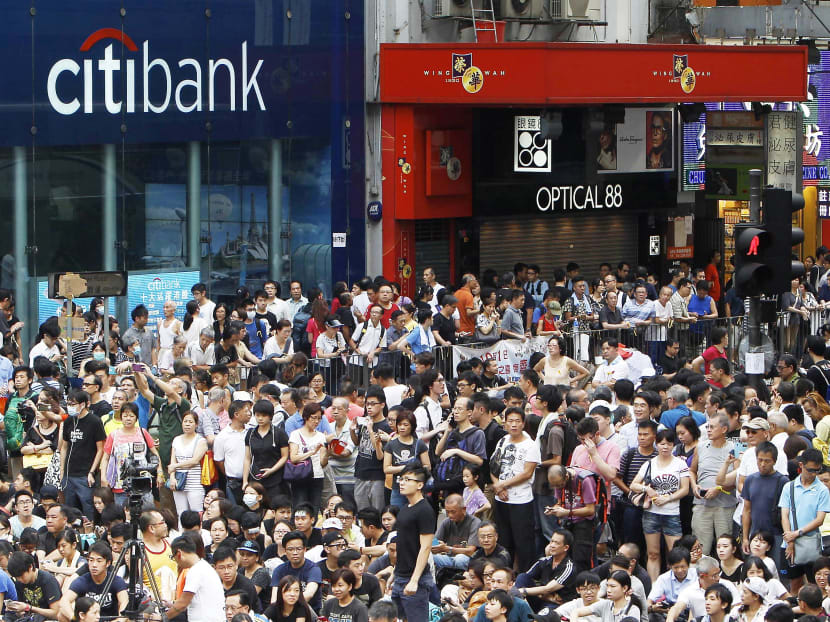Hong Kong’s financial hub status faces test as protests mount
HONG KONG — Having prospered through the handover to China, the Asian financial crisis in 1997 and the severe acute respiratory syndrome (SARS) epidemic in 2003, Hong Kong is being tested yet again. This time, some analysts are warning that the territory’s status as a leading financial hub may be damaged if the political unrest creates uncertainty over the longer term, potentially benefiting rivals such as Singapore and Shanghai.

Protesters in Hong Kong’s Mongkok shopping district on Monday. Retailers looking to benefit from
the seasonal influx of mainland tourists during China’s Golden Week holidays
are finding their plans scuttled
by the protests.
Photo: REUTERS
HONG KONG — Having prospered through the handover to China, the Asian financial crisis in 1997 and the severe acute respiratory syndrome (SARS) epidemic in 2003, Hong Kong is being tested yet again. This time, some analysts are warning that the territory’s status as a leading financial hub may be damaged if the political unrest creates uncertainty over the longer term, potentially benefiting rivals such as Singapore and Shanghai.
“If this escalates to a whole new level, questions will be raised about Hong Kong’s role as a financial centre,” said Dr Chua Hak Bin, a Singapore-based economist at Bank of America Merrill Lynch. This would definitely make Singapore appear as a more stable alternative, he added.
“If this keeps going and becomes a recurring phenomenon, we’ll probably see some businesses pulling out of Hong Kong. Singapore will be a great place for these businesses to relocate to,” said Mr Nader Naeimi, head of dynamic asset allocation at Sydney-based AMP Capital Investors.
Hong Kong and Singapore have long jostled for prominence, and the performance gauges have been mixed. Hong Kong’s stock market, with a total capitalisation of US$3.7 trillion (S$4.72 trillion), is the world’s fifth-largest, with more than half the companies on the Hang Seng Index from the Chinese mainland. Meanwhile, the total value of firms listed on the Singapore Exchange is far behind, at about S$1 trillion.
In terms of economic output, Singapore, with a population of 5.4 million, boasted a gross domestic product of US$298 billion last year, while Hong Kong, with 7.2 million, had a GDP of US$274 billion, World Bank data showed. Singapore also has the lead in foreign exchange trading, petrochemical refining and pharmaceuticals manufacturing.
DBS’ Singapore-based economist Irvin Seah took a different view, playing down the impact of the unrest and saying how the situation unfolds would not affect Singapore.
“Keep in mind that (a country’s) political situation is only one factor that affects foreign direct investment. This is why we see that Thailand is still attracting investments, despite extensive protests across the years,” he said.
“So, unless the situation persists, Hong Kong’s status as a choice business location will not change much and it will remain an important hub, particularly for financial services. Either way, I don’t see how this will affect or even benefit Singapore. The supposed rivalry between Hong Kong and Singapore is increasingly irrelevant, with the former serving as a platform to access Greater China, while Singapore serves as a gateway to ASEAN,” Mr Seah said.
He added that Hong Kong’s main competition was with emerging Chinese cities such as Shanghai or Shenzhen, where markets are becoming increasingly accessible. Shanghai is rapidly advancing as a financial centre, with moves to internationalise the yuan and a year-old free trade zone making it easier for multinational companies to do business.
As the near-term outlook deteriorated after the civil unrest escalated to a scale not seen since the 1960s, Hong Kong’s benchmark stock index yesterday fell to a three-month low, finishing with its biggest monthly fall since May 2012. The Hang Seng Index lost 1.3 per cent to close at 22,932.98, extending the 1.9 per cent drop on Monday and ending the month with a 7.3 per cent loss. Banks, property developers and retailers were the main losers.
As thousands of protesters continued to occupy major roads in main shopping areas in Admiralty, Wan Chai, Causeway Bay and Mongkok, retailers looking to benefit from the seasonal influx of mainland tourists during China’s Golden Week holidays are finding their plans scuttled. Travel agents estimated that Chinese tourist arrivals had dropped by up to 30 per cent because of the unrest.
AGENCIES, with additional reporting from WONG WEI HAN





